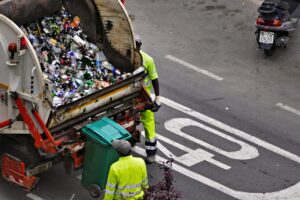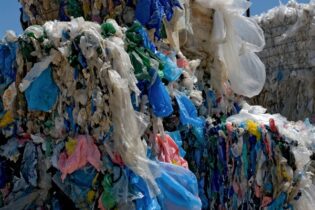The South African waste management industry plays a vital role in keeping our environment clean and can be counted among the most efficient on the African continent. Kate Stubbs, Marketing Director at Interwaste, shares her insights into what can be expected in the waste industry for 2022.
The South African waste management industry is evolving and is one of the most efficient on the continent. However, the country is still generating large amounts of waste annually and most of our landfill sites are fast approaching full capacity. According to the latest available statistics, South Africans generate roughly 122 million tonnes of waste per year. Of this waste, a maximum of only 10% is recycled or recovered for other uses, while at least 90% is landfilled or dumped illegally. Current Situation Currently, South Africa has a comprehensive legislative framework, and that is mainly due to the fact that it’s still relatively new. However, we all know that we have a severe waste management problem that needs our immediate attention. Some of the biggest drivers for waste are population growth, urbanisation, a lack of compliance and general behaviour towards managing waste effectively. The population of South Africa was estimated to be 60.14 million at mid-year 2021 – an increase of about 604 281 (1.01%) since mid-2020. We are also experiencing rapid urbanisation and have one of the highest urbanisation rates globally. This means we are going to produce more waste – which will inevitably exacerbate an already quite dire situation. We are also dealing with a legacy issue; many of our landfills are not compliant with the current legislature and are not being managed effectively. This in turn pollutes our natural resources and environment. Although I do not like to single out plastics (as plastics do have their role to play), we have to face the fact that South Africa has a plastics issue, due to its incorrect handling and disposal. The Covid-19 pandemic saw the rise of single-use plastics through personal protective equipment and single-use plastic wrapping. The pandemic also saw a rise in illegal dumping and a general rise in municipal solid waste production – which naturally put the municipal waste management system under a lot of pressure. Another challenge we are facing is that we don’t have accurate data within the market; we have not fully quantified our waste problem. These statistics, coupled with the current state we are in as a country, reflect an urgent need for us to start focusing on diversion from landfill, finding alternative uses and revenue streams, and a commitment to adhering to legislative frameworks. We can no longer look at waste management with a linear view though – we must change our behaviour from the ‘throwaway culture’ many businesses, individuals and households have to a more circular approach, where we try to eliminate waste wherever possible or reuse, recycle and recover it for alternate purposes. The good The upside is that South Africa has a large informal waste sector. According to the Waste Pickers Association, South Africa has more than 90 000 waste pickers. The CSIR stated that in 2014 alone informal pickers saved municipalities between R309 million and R748 million in landfill airspace. This by simply diverting recyclables from landfills.They are doing an outstanding job and it’s encouraging to see that numerous municipalities are now developing initiatives to formalise informal workers.
We have seen this through the development of the waste pickers integration guideline for South Africa, produced by the Department of Forestry, Fisheries and the Environment in 2020. It provides guidance to municipalities and industry on measures to improve their working conditions. The opportunity Waste legislation is one of the key drivers of innovation in the waste management industry. The updated National Waste Management Strategy (NWMS) talks to the circular economy, waste beneficiation, job creation and SMME development. Additionally, the Extended Producer Responsibility (EPR) regulations and carbon tax schemes have brought a lot of great shifts in the way waste is viewed and will become a great driver in the ongoing development of waste technology. However, there needs to be enforcement and compliance. Support structures need to be put in place to ensure that people are obeying the legislature. We need to implement, measure and manage. There also needs to be greater investment in infrastructure and skills development for the officials and people who are decision-makers in the waste industry. We need to see practical expertise being strategically placed with our public and private sectors. New models need new skills. The future As a country, we have many challenges across the board, but we need to figure out how to operate better for economic, social and environmental purposes. Waste is complex and, although the theory sounds very simple, there are many complexities and very limited understanding. Before we even get into some of the exciting changes that need to be implemented within the waste industry, the first thing that needs to change is our attitude towards waste. We have seen a lot of awareness from the government and private sector to drive change; however, we need to educate the public about the value of waste, the costs associated with the handling of waste, as well as transport and labour costs. Zero waste does not mean zero cost. In terms of what we can expect in the industry in 2022:- With the upcoming bans of organic waste to landfill in 2028 and the Western Cape already banning 50% of organic waste disposal to landfill in 2022, we are seeing a large focus on alternative organic waste processing such as composting, bioremediation and biogas plants.
- The global and local focus on decarbonisation and a transition to introducing alternative energy sources is creating an opportunity for more development and investment in the renewable energy sector such as solar, wind, green hydrogen and waste-to-energy.
- New waste legislation continues to be developed and implemented, such as the EPR regulations and more bans of certain waste types to landfill disposal continue.
- The technological side is also going to be a big focus in 2022. Digital disruption has the potential to reshape South Africa and the waste sector will see the digitisation of waste collection coming to the forefront, providing important benefits given that complex industrial processes can now be automated.
- We require a stronger focus on waste data capturing and reporting to provide insights to make accurate decisions and assist with the development of appropriate solutions.
- We can also look forward to businesses becoming more aware of their environmental footprint.







